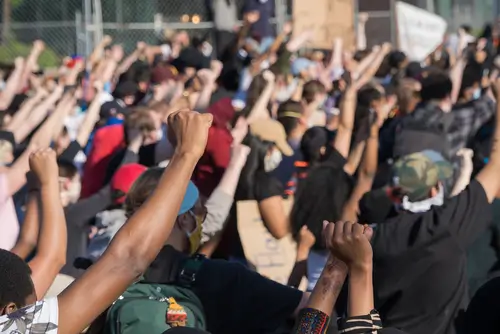By Brian Figeroux, Esq.
January 2025, President Donald Trump signed a series of executive orders that have significant implications for civil rights in the United States. These actions, encompassing areas such as diversity initiatives, immigration policies, and LGBTQ+ rights, represent a marked shift in federal policy. Dr. Martin Luther King Jr., a staunch advocate for equality and justice, would likely have opposed these measures, viewing them as setbacks to the progress made in civil rights.
- Termination of Federal Diversity, Equality, and Inclusion (DEI) Programs
One of President Trump’s inaugural executive orders mandates the elimination of all federal Diversity, Equity, and Inclusion programs. This directive instructs the Office of Management and Budget (OMB) and the Office of Personnel Management (OPM) to identify and dismantle DEI-related initiatives across government agencies.
Dr. King championed the pursuit of equality and the dismantling of systemic racism. He believed in proactive measures to address historical injustices and promote inclusivity. The removal of DEI programs, which aim to foster diverse and equitable workplaces, runs counter to King’s vision of a society where individuals are judged by their character rather than their race.
- Immigration Policies and Border Security Enhancements
President Trump’s executive actions on immigration include deploying U.S. troops to the southern border, completing the border wall, ending birthright citizenship, and labeling certain international cartels as terrorist organizations.
Dr. King advocated for the rights of marginalized communities and opposed policies that discriminated based on nationality or ethnicity. He emphasized the importance of compassion and understanding in addressing social issues. Policies that potentially marginalize immigrant communities and deny citizenship based on birthplace would likely have been met with his disapproval.
- Rollback of Transgender Protections
Among the executive orders signed is one that reverses protections for transgender individuals, particularly concerning their participation in sports and inclusion in military service.
Dr. King’s philosophy was rooted in the inherent dignity and worth of every individual. He fought against all forms of discrimination and would likely have opposed measures that exclude individuals based on their gender identity, viewing such actions as antithetical to the principles of justice and equality.
- Renaming of Geographical Landmarks
President Trump issued orders to rename the Gulf of Mexico to the “Gulf of America” and revert Mount Denali to its former name, Mount McKinley.
While these actions may seem symbolic, they reflect a broader agenda of emphasizing certain historical narratives over others. Dr. King valued inclusivity and the recognition of diverse cultural heritages. Renaming landmarks without considering the significance to indigenous and local communities could be seen as disregarding the rich tapestry of American history.
- Implementation of Project 2025
Project 2025 outlines a conservative agenda with potential implications for civil rights, including restricting abortion access, opposing LGBTQ+ rights, and transforming federal agencies.
Dr. King was a proponent of expanding rights and freedoms. Policies that seek to limit individual rights and target specific communities would likely have been contrary to his vision of a just society.
Conclusion
The executive orders signed by President Trump on January 20, 2025, signal a significant shift in federal policies affecting civil rights. Dr. Martin Luther King Jr., who dedicated his life to the pursuit of equality and justice, would likely have opposed these measures, viewing them as regressions in the ongoing struggle for civil rights. As we reflect on these developments, it is essential to consider how they align with the values of inclusivity, equity, and respect for all individuals.

